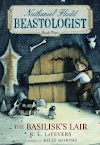Once you have a completed draft, it’s time to look at what you actually managed to get out of your head onto the paper. Or if the idea holds up under daylight. Or if there’s really as much there there as you’d hoped. Distance helps you obtain a higher level of objectivity with which to do that.
Revision, or Macro Revision, as I think of it, is all about the story. Does the manuscript contain all the vital elements needed to create a gripping story. Does it realize its potential? News flash: Most people’s don’t at the first draft stage. Seriously. Or if they revise as they go, you can bet their first pass at a scene isn’t perfect.
So here then, are the things to look at when sitting down to revise a story.
MACRO REVISION
(I changed my mind. This isn't really a checklist, it's more of a list of questions to ask yourself as you try to analyze your manuscript. If you use it as a checklist of things you must have, you will go mad. So don't.)
VOICE
Have you chosen the right person to tell this story?
90% of the time you will have, but sometimes there are times when the story is better told through someone else, less removed from the action. Think Dr. Watson in Sherlock Holmes.
Have your selected the right POV?
Is your first person narrative flat? If you can easily substitute third person pronouns and have the whole thing make sense and flow, chances are you haven’t taken full advantage of the first person form. Conversely, have you at least tried first person? What happens when you get totally inside your character's head? Does he come even more alive?
If you are working with a familiar scenario (dreaded move, new school, losing a best friend) what fresh, new, unique twist do you bring to it?
SETTING
Have you selected the best setting for this story? Is there a different setting that would add more inherent conflict? Create more tension? Echo your thematic elements?
PROTAGONIST/PLOT
Does your character want something? Or not want something? Is that desire driving the story or at least some of his actions?
Is your character an active participant in the story? If not, is he taking baby steps toward becoming one?
Is there something that keeps getting between the main character and his goal? Would the story be stronger if there was?
Is there a source of tension?
Is your story building toward something?
If not, what provides the dramatic push or narrative drive toward the end?
Do the obstacles the protagonist faces increase in difficulty?
Does he ever fail? (Remember, we learn more from our mistakes than our successes!)
Are their times when he makes things worse by his own actions?
Is there cause and effect in your story, or is it more of a string of unconnected events. (This happened and then this happened and then this happened, but nothing caused any of the other things to happen.)
Is your character a different person at the end of the book than they were at the beginning?
Could he have solved this problem or puzzle or dealt with the core issues at the beginning of the book? If so, have you given him a big enough growth arc?
Will people be emotionally invested in his journey? Will they care if he fail? What is at risk if he fails?
Are there measurable baby steps he makes on his journey? Or does he just wake up one day, able to tackle the problem? Do we see his growth on the page?
Are the ideas and issues fully developed? Is there a true beginning, middle, and end? Or do you go straight from the beginning to the end without fully developing the issues in the middle?
Do the actions and events in the book impact different parts of the protagonist’s life? School, home, other relationships?
Do your secondary characters have arcs, too? They will be smaller and more subtle, but they should be there.
THEME
Why are you writing this story? What piece of You is in there? Why are you the most perfect person to tell this story?
Are the themes universal? Is there room for Everyman in your story?
Do the actions and events of your story support the theme you’re working with?
Now that you know your theme, is there a way you can make it even more powerful?

















6 comments:
Wow.
just...Wow.
I hope that's not an overwhelmed Wow, Story Weaver. Many of the questions address the same issue, but from a different angle. For example, the first three questions under protagonist/plot are all basically about the same thing--building a narrative drive...
Not overwhelmed just...impressed at how you're able to word things to make them so understanable.
I was completely overwhelmed ... and then I realized that this is stuff that you think about when you're done, when you can step back and start seeing the forest for the trees.
Sorry Katy. As I was writing them up, I kept trying to envision how one could use them if one was a revise-as-you-go writer. Being as how that's not my process, I'm pretty clueless. I do think RAYGWs should probably only look at the plot/protagonist issues. The others--thematic, voice, setting--just aren't suited to being addressed on an as-you-go basis.
So yeah, absolutely for when you're done and can see the forest for the trees. OR, sometimes I look at those questions if I am having trouble coming up with scenes. They work for scene generating as well. At least for me...
Am i the only one who feels inspiration flowing freely from all the corners of the globe tonight?
Post a Comment